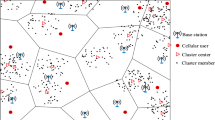Abstract
A downlink networkwide opportunity scheduling scheme, called coordinated location-dependent downlink scheduling scheme (CLDSS), that combines the intracell power allocation and intercell transmission coordination is proposed for cellular TD-CDMA networks. Each cell in the network is partitioned into co-centric areas based on the load distribution, and the transmission from base stations is controlled based on the intracell load as well as coordinated to minimize intercell interference. The performance in terms of average throughput employing the CLDSS is analyzed for a 2-cell system in shadow fading environment with two partitioned areas in each cell—which provides an upper bound on the cellular system performance. Monte Carlo simulation study is also done to validate the numerical results obtained from the analytical study. It is shown that CLDSS scheme can provide soft throughput, i.e., the average throughput remains relatively invariant with the number of users and also can provide better performance in the non-uniform user distribution within a cell when compared to non-CLDSS schemes.
Similar content being viewed by others
References
Bender P., Black P., Grob M., Padovani R., Sindhuushayana N., Viterbi A. (2000) CDMA/HDR: A bandwidth-efficient high-speed wireless data service for nomadic users. IEEE Communications Magazine 38: 70–77
Jamalipour A. et al (2005) A tutorial on multiple access technologies for beyond 3G mobile networks. IEEE Communications Magazine 43: 110–117
Fattah H., Leung C. (2002) An overview of scheduling algorithms in wireless multimedia networks. IEEE Wireless Communications Magazine 9: 76–83
Anpalagan A., Sousa E. (2004) A distributed packet scheduling scheme with interference avoidance for non-real time applications in CDMA networks. International Journal of Wireless Information Networks 11: 79–92
Esmailzadeh R., Nakagawa M. (2003) TDD-CDMA for wireless communications. Artech House, London
Joshi, N., et al. (2000). Downlink scheduling in CDMA data networks. In Proceedings of ACM mobicom (pp. 179–190).
Gurbuz O., Owen H. (2000) Dynamic resource scheduling schemes for W-CDMA systems. IEEE Communications Magazine 38: 80–85
Janitti R., Kim S.-L. (2003) Power control with partially known link gain matrix. IEEE Transactions Vehicular Technology 52: 1288–1296
Cao, Y., & Li, V. (2001, September). Scheduling algorithms in broadband wireless networks. In IEEE proceedings (Vol. 89, pp. 76–87).
Berggren F., Kim S.-L., Jantti R., Zander J. (2001) Joint power control and intracell scheduling of DS-CDMA nonreal time data. IEEE Journal on selected areas in communications 19: 1860–1870
Yavuz M., Paranchych D., Wu G. (2001) Performance improvement of the HDR system due to hybird arq. IEEE Transactions Vehicular Technology 3: 1937–1941
Bedekar, A., et al. (1999). Downlink scheduling in CDMA data networks. In Proceedings of IEEE Globecom (pp. 2653–2657).
Veronesi, R., et al. (2004, March). Distributed dynamic resource allocation with power shaping for multicell SDMA packet access networks. IEEE Wireless Communications and Networking Conference (Vol. 4, pp. 2515–2520).
Ghasemi, A., & Sousa, E. (2005, June). Distributed intercell coordination through time reuse partitioning in downlink CDMA. IEEE Wireless Communications and Networking Conference (Vol. 4, pp. 1992–1997).
Kwon, H., & Lee, B. G. (2006, June). Distributed resource allocation through noncooperative game approach in multi-cell OFDMA systems. IEEE International Conference on Communications (pp. 4345–4350).
Takeo, K. (2001, June). Time slot assignment using cell partitioning in CDMA cellular systems. IEEE International Conference on Communications (Vol. 5, pp. 1381–1385).
Kwon, S., et al. (2003, April). Downlink intercell coordination for DS-CDMA non real time data. IEEE Vehicular Technology Conference (Vol. 3, pp. 1689–1693).
Park, D., et al. (2005, November). Wireless packet scheduling based on the cumulative distribution function of user transmission rates. IEEE Transactions on Communication, 53, 1919–1929.
Berggren F. et al (2001) October). Joint power control and intracell scheduling of DS-CDMA nonreal time data. IEEE Journal of Selected Areas on Communication 19: 1860–1870
Bonald, T., et al. (2006). Inter-cell coordination in wireless data networks, European Transactions on Telecommunications, 17, 303–312.
Rulnick J.M., Bambos N. (1999) Power-induced time division on asynchronous channels. ACM Journal of Wireless Networks 5: 71–80
McGuire, M., & Plataniotis, K. N. (2003, July). Dynamic model-based filtering for mobile terminal location estimation. IEEE Transactions Vehicular Technology, 52, 1012–1031.
Gilhousen, K., et al. (1991, May). On the capacity of a cellular CDMA system. IEEE Transactions Vehicular Technology, 40, 303–312.
Rappaort T.S. (1996) Wireless communications: Principles and practice. Prentice-Hall, Englewood Cliffs
Author information
Authors and Affiliations
Corresponding author
Rights and permissions
About this article
Cite this article
Wu, G., Anpalagan, A.S. A Coordinated Location-dependent Downlink Scheduling Scheme in Cellular TD-CDMA Networks with Partitioned Cells: A Two-Cell Two-Partition Case. Wireless Pers Commun 53, 481–502 (2010). https://doi.org/10.1007/s11277-009-9680-9
Received:
Accepted:
Published:
Issue Date:
DOI: https://doi.org/10.1007/s11277-009-9680-9




